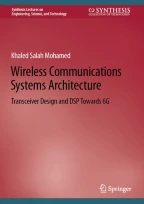Wireless Communication Systems: Foundation

In this chapter the principles to the digital wireless communication systems is introduced. A digital wireless communication system consists of transmitter, channel and receiver. Moreover, it covers the wireless communication foundations, reviews the history of it, and introduces the applications, requirements and key technical features. The digital wireless signal processing such as: modulation, demodulation, orthogonal frequency division multiple access and error correction are discussed. Wireless communications provides mobility (on the go), flexibility (any place, any time, temporary, permanent), no problems with wiring also cost reducing, robust against disasters like earthquake, fire. Wireless communication is no longer a luxury but a necessity. Wireless Communication Systems also provide different services/technologies like video conferencing, cellular telephone, paging, TV, Radio etc. Speed and mobility for different wireless communication systems.
This is a preview of subscription content, log in via an institution to check access.
Access this chapter
Subscribe and save
Springer+ Basic
€32.70 /Month
- Get 10 units per month
- Download Article/Chapter or eBook
- 1 Unit = 1 Article or 1 Chapter
- Cancel anytime
Buy Now
Price includes VAT (France)
eBook EUR 50.28 Price includes VAT (France)
Softcover Book EUR 63.29 Price includes VAT (France)
Hardcover Book EUR 84.39 Price includes VAT (France)
Tax calculation will be finalised at checkout
Purchases are for personal use only
References
- R. Mendrzik et al., Harnessing NLOS components for position and orientation estimation in 5G millimeter wave MIMO. IEEE Trans. Wirel. Commun. 18(1), 93–107 (2019). ISSN: 1536-1276 Google Scholar
- J.R. Smith, Modern Communication Circuits, 2nd edn. (McGraw Hill, New York, 1998) Google Scholar
- https://www.radartutorial.eu/08.transmitters/Magnetron.en.html
- https://www.livescience.com/50326-what-is-ultraviolet-light.html
- https://www.nhs.uk/conditions/jaundice-newborn/treatment/
- https://www.dentalcare.com/en-us/professional-education/ce-courses/ce570/what-is-needed-to-generate-x-rays
- https://physics.aps.org/articles/v9/50
- R. Steele, L. Hanzo (eds.), Mobile Radio Communications: Second and Third Generation Cellular and WATM Systems, 2nd edn. (Wiley, Chichester, 1999) Google Scholar
- F. Xiong, Digital Modulation Techniques (Artech House, Norwood, 2006) Google Scholar
- Y. Qu, G. Zheng, H. Ma, X. Wang, B. Ji, H. Wu, A survey of routing protocols in WBAN for healthcare applications. Sensors 19, 1638 (2019) ArticleGoogle Scholar
- https://www.mathworks.com/discovery/wireless-transceiver.html?fbclid=IwAR106B-R3MTfJOrN8nF8j-bQedDX2pSQC-PX9FA1MkzSaq57UCGHS9mOXus
- C.E. Shannon, A mathematical theory of communication. Bell Syst. Tech. J. 27, 379–423 (1948) Google Scholar
- S. Cherry, Edholm’s law of bandwidth. IEEE Spectr. 41(7), 58–60 (2004). https://doi.org/10.1109/MSPEC.2004.1309810ArticleGoogle Scholar
- S. Haykin, M. Moher, An Introduction to Analog and Digital Communications (Wiley, Hoboken, 2006) Google Scholar
- B.P. Lathi, Z. Ding, Modern Digital and Analog Communication Systems, 4th edn. (Oxford University Press, Oxford, 2009) Google Scholar
- J.G. Proakis, M. Salehi, Fundamentals of Communication Systems (Prentice Hall, Hoboken, 2004) Google Scholar
- A. Abdi, C. Tepedelenlioglu, M. Kaveh, G. Giannakis, On the estimation of the K parameter for the Rice fading distribution. IEEE Commun. Lett. 92 –94 (2001) Google Scholar
- X. Leturc, P. Ciblat, C.J. Le Martret, Estimation of the Ricean K factor in the presence of shadowing. IEEE Commun. Lett. 24(1), 108–112 (2020) ArticleGoogle Scholar
- https://www.nutaq.com/blog/doppler-shift-estimation-and-correction-wireless-communications-0
- J. Geier, Wireless Networks First-Step (Cisco Press, Indianapolis, 2004), 264 pp. ISBN: 1-58720-111-9 (Safari Book) Google Scholar
- S. Rackley, Wireless Networking Technology (Newnes, London, 2007), 416 pp. ISBN: 0-7506-6788-5 (Safari Book) Google Scholar
- R.G. Gallager, Principles of Digital Communication (Cambridge University Press, Cambridge, 2008) Google Scholar
- C.E. Shannon, A mathematical theory of communication. Bell Syst. Tech. J. (1948) Google Scholar
- J.G. Proakis, M. Salehi, Communication Systems Engineering, 2nd edn. (Prentice Hall, Hoboken, 2002) Google Scholar
- R.E. Ziemer, W.H. Tranter, Principles of Communications: Systems, Modulation and Noise, 6th edn. (Wiley, Hoboken, 2010) Google Scholar
- B.P. Lathi, Z. Ding, Modern Digital Analog Communication Systems, 4th edn. (Oxford University Press, Oxford, 2009) Google Scholar
- B. Sklar, Digital Communications: Fundamentals and Applications, 2nd edn. (Prentice-Hall, Hoboken, 2001) Google Scholar
- S. Haykin, Communication Systems, 4th edn. (Wiley, Hoboken, 2001) Google Scholar
- M.P. Fitz, Fundamentals of Communications Systems (McGraw Hill, New York, 2007) Google Scholar
- L. Hanzo, W. Webb, T. Keller, Single- and Multi-Carrier Quadrature Amplitude Modulation: Principles and Applications for Personal Communications, WLANs and Broadcasting (Wiley, Chichester, 2000) Google Scholar
- T.S. Rappaport, Wireless Communications: Principles and Practice (Prentice-Hall, Hoboken, 1996) Google Scholar
- A. Paulraj, R. Nabar, D. Gore, Introduction to Space-Time Wireless Communications (Cambridge University Press, Cambridge, 2003) Google Scholar
- D. Tse, P. Viswanath, Fundamentals of Wireless Communication (Cambridge University Press, Cambridge, 2005) Google Scholar
- https://www.nrc.gov/about-nrc/radiation/health-effects/radiation-basics.html
Author information
Authors and Affiliations
- Siemens Digital Industries Software, Fremont, CA, USA Khaled Salah Mohamed
- Khaled Salah Mohamed
You can also search for this author in PubMed Google Scholar
Corresponding author
Rights and permissions
Copyright information
© 2022 The Author(s), under exclusive license to Springer Nature Switzerland AG
Cite this chapter
Mohamed, K.S. (2022). Wireless Communication Systems: Foundation. In: Wireless Communications Systems Architecture. Synthesis Lectures on Engineering, Science, and Technology. Springer, Cham. https://doi.org/10.1007/978-3-031-19297-5_1
Download citation
- DOI : https://doi.org/10.1007/978-3-031-19297-5_1
- Published : 01 November 2022
- Publisher Name : Springer, Cham
- Print ISBN : 978-3-031-19296-8
- Online ISBN : 978-3-031-19297-5
- eBook Packages : Synthesis Collection of Technology (R0)eBColl Synthesis Collection 11
Share this chapter
Anyone you share the following link with will be able to read this content:
Get shareable link
Sorry, a shareable link is not currently available for this article.
Copy to clipboard
Provided by the Springer Nature SharedIt content-sharing initiative

